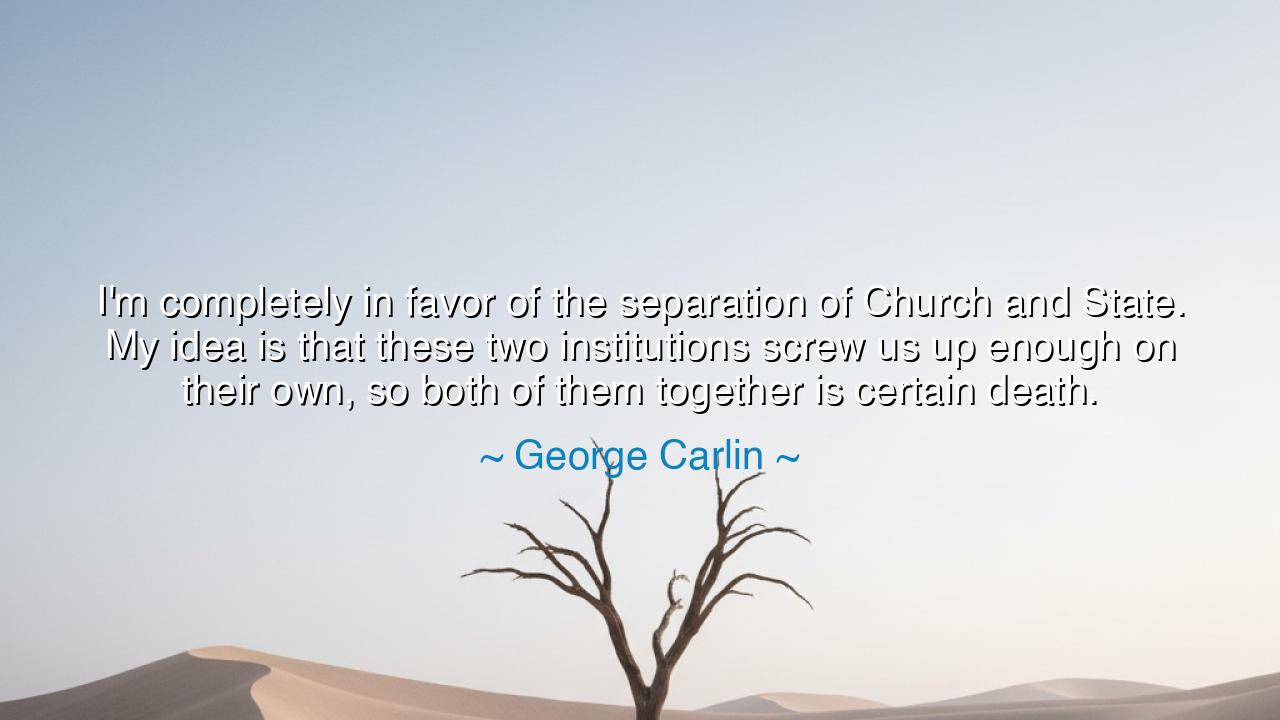
I'm completely in favor of the separation of Church and State. My
I'm completely in favor of the separation of Church and State. My idea is that these two institutions screw us up enough on their own, so both of them together is certain death.






In the biting and fearless words of George Carlin, the philosopher of the stage and prophet of laughter, there burns a truth as old as civilization itself: “I’m completely in favor of the separation of Church and State. My idea is that these two institutions screw us up enough on their own, so both of them together is certain death.” Though spoken with jest, this is no mere joke — it is the cry of a man who saw, with painful clarity, the dangers that arise when power and sanctity intertwine. Beneath the humor lies wisdom born from centuries of human folly, from the countless times men have clothed tyranny in the robes of the sacred and called it righteousness.
The origin of this quote rests not only in Carlin’s sharp wit but in the long and bloody history of human governance. He lived in a modern age, yet his words echo back to every century in which the Church and the State, when merged, brought forth suffering. The Church, wielding the power of eternal judgment; the State, holding the sword of temporal authority — when these two unite, they form an empire not of heaven, but of fear. Carlin, in his own irreverent way, warns us that when faith becomes law and law becomes faith, truth dies and liberty follows. It is the same truth once whispered by philosophers, shouted by revolutionaries, and written in the blood of martyrs.
To understand his meaning, one must remember that faith and power are sacred only when they are separate. Faith speaks to the soul; power governs the body. The one seeks to elevate the heart; the other to preserve order. But when they merge, they corrupt one another. Religion becomes the servant of politics, and politics takes on the mask of divine authority. The result is not holiness, but hypocrisy, not justice, but oppression. Carlin’s humor is sharp precisely because it reveals the grotesque truth: that human beings, already prone to error, magnify their cruelty when they believe that both God and government stand behind their deeds.
History offers us grim examples. Consider the Spanish Inquisition, where the Church, allied with the Crown, hunted the souls of its own people in the name of purity. Fear became doctrine, torture became sacrament, and dissent became heresy. Or remember the Salem Witch Trials, when the fervor of the faithful became the tool of civic power, condemning the innocent in the name of divine justice. In both cases, the mingling of belief and authority produced the same poison — fanaticism sanctified by law. Carlin, with his laughter, sought to protect humanity from such madness by reminding us that both institutions, though flawed, must remain distinct if freedom is to survive.
And yet, Carlin’s wisdom is not cynical — it is realistic. He does not condemn faith, nor law, but the arrogance of men who seek to wield both. For he understood the frailty of human nature. “These two institutions screw us up enough on their own,” he says — meaning that even in their separate forms, religion and government can fall into corruption, greed, and deceit. But when they combine, their errors multiply. The result, as he puts it with dark humor, is “certain death.” He means not only physical death — the wars, persecutions, and genocides that history has shown — but also the death of reason, the death of compassion, and the death of the human spirit that follows when fear replaces freedom and dogma replaces thought.
In his jest, Carlin performs the work of the ancient satirists, like Diogenes or Voltaire, who used laughter to pierce through hypocrisy. Laughter, in this sense, becomes a weapon of truth — a mirror in which the powerful see their folly. Carlin’s comedy was no mere entertainment; it was philosophy disguised as rebellion. His laughter mocked not the sacred, but the corruption of the sacred; not faith itself, but the use of faith as a tool of control. In this, he continues the lineage of those who, from Socrates to Spinoza, spoke truth to both the temple and the throne, often at great personal cost.
So, my children of thought, take this teaching as both warning and guide: never allow the Church and the State to become one. Let the soul remain free to seek its own truth, and the law remain bound to reason, not revelation. Defend the boundary between conscience and authority, for in that space lies liberty itself. Honor faith, but do not let it command your neighbor. Respect law, but do not let it dictate belief. A nation that preserves this balance walks in light; a nation that destroys it walks in chains.
Therefore, remember Carlin’s laughter not as mockery, but as wisdom wrapped in jest — a fire meant to awaken the sleeping mind. Laugh at hypocrisy, question power, and guard the sanctity of freedom with both courage and humor. For when truth and laughter walk hand in hand, tyranny trembles. And as Carlin reminds us with his irreverent yet holy insight, to keep Church and State apart is not rebellion — it is the only way for both the soul and society to survive.






AAdministratorAdministrator
Welcome, honored guests. Please leave a comment, we will respond soon